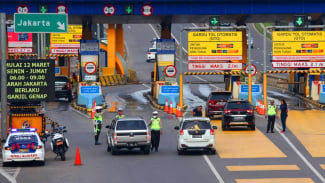VIVAnews - “I would like to continue my work on the development of our nation and country for five more years. But now is not the time to announce it, but later! After the Presidential Elections of 2009 officially starts.”
That was part of Susilo Bambang Yudhoyono's speech in Jakarta on 19th October 2008. He spoke in front of hundreds of Democratic Party supporters in the Pekan Raya Jakarta arena. As Head of the Advisory Council of the Democratic Party, he gave the sign that he was again moving in for the Presidential seat on the upcoming 2009 General Elections.
Yudhoyono's speech has answered the questions of worried Democratic Party. They have been counting on him as their 2009 Presidential candidate. This also put at ease the people at Golkar’s Regional Leadership Assembly. They intended, in their National Leaders Meeting (Rapimnas), held on 18th October, to support the Yudhoyono-Jusuf Kalla ticket for the second time.
Born in Pacitan, 9th September 1949, Yudhoyono’s popularity began to rise when he was Minister of Mining and Energy, during the Abdurrahman Wahid administration. When he was transferred to take the position of Coordinating Minister for Social, Politics, and Security Affairs, to replace General (ret.) Wiranto, his popularity was more radiant than ever. It was in this position that he was to be truly tested.
Son-in-law of the late General (ret.) Sarwo Edhi, he was the one who was in charge of the Presidential Decree, issued by Abdurrahman Wahid, the effect of which would be to disband the House of Representatives (DPR) and the People's Consultative Council (MPR), and the Golkar political party. Yudhoyono chose to put the decree in his drawer and Abdurahman Wahid was then unseated from the Presidential office.
Vice President Megawati Soekarnoputri then became the President of Indonesia. Yudhoyono tried to go for the Vice President position but failed. The House of Representatives in Senayan chose rather to have Hamzah Haz. Mega gave Yudhoyono the position of Coordinating Minister for Politics and Security Affairs instead. As a minister, Yudhoyono wooed the public. Megawati was a tight-lipped President, and was soon drowned by the Minister's stage craft and smiles. Silently, a rivalry developed between the two. Nearing the first direct Presidential Elections, Yudhoyono stepped down from the Minister seat on 11th March 2004. He was preparing himself to become a presidential candidate, riding on the Democratic Party.
The Democratic Party then popularized Yudhoyono with the name SBY, an acronym for Susilo Bambang Yudhoyono. Pairing with Golkar politician, Jusuf Kalla, Yudhoyono went against four other couples. Yudhoyono-Kalla, was favored by 3 political parties, the Democratic Party (Partai Demokrat), the Crescent Star Party (Partai Bulan Bintang) and the Indonesian Justice and Unity Party (Partai Keadilan dan Persatuan Indonesia). On their first run, this couple, who were backed by three parties that jointly only had 11 percet votes, themselves obtained 33.57 percent votes or a total of 39,838,184 votes.
On the second round, Yudhoyono and Kalla had to run against the incumbent president Megawati and her vice presidential candidate, Hasyim Muzadi. The parties who favored Amien Rais-Siswono Yudhohusodo ticket, the Justice and Prosperous Party (Partai Keadilan Sejahtera) and the National Mandate Party (Partai Amanat Nasional), turned over their support to Yudhoyono. While the Functional Group Party (Golkar) whose favored candidate, Wiranto Salahudin, had lost, turned their support to Megawati instead. But again, Yudhoyono won with votes totaling 6,266,350 or 60.62 percent.
Yudhoyono became the first President in Indonesia's history to be elected directly by the people.
After a month in the Presidential seat, Yudhoyono was faced with an earthquake that hit Nabire, Papua on 26th November 2004. A month after that, the biggest tsunami and earthquake ever to have happened in Indonesia, hit Nangroe Aceh Darussalam and Nias, North Sumatera. The death toll was by the hundreds of thousands. Indonesia was mourning, the world was shocked. The leadership of the 1973 National Army Academy Valedictorian was tested in handling the catastrophe.
Behind the disastrous calamity, the tsunami brought a blessing in disguise - it brought peace to the conflict region of Aceh. Yudhoyono, together with Jusuf Kalla, was able to convince the Aceh combatants to sit together in Helsinki and engage in peace talks. That was when a Memorandum of Understanding was signed between the Independent Aceh Movement (GAM) and Indonesia, represented by the Minister for Justice and Human Rights at the time, Hamid Awaluddin. Yudhoyono's name would then rise in the international eyes. He was even nominated for the Nobel Peace prize.
Yudhoyono’s popularity has its ups and downs, even though the surveys show that he remains undefeated by other candidates. His popularity took a dive when he raised the price of fuel oil, electricity, and telephones in 2005. The rise in prices was then followed by a kerosene-to-gas conversion program, carried out by reducing the kerosene supply. Yudhoyono was heavily criticized, but they countered this with the Direct Cash Aid program for the under-privileged.
Yudhoyono's popularity was again tested when the world oil prices soared in mid-2008. Not wanting to risk an economic slowdown, he again made an unpopular decision, to again raise the price of fuel oil. The Direct Cash Aid was again launched to counterbalance the inflation.
But his popularity was already diving, and political figures, such as Wiranto took advantage of it. Wiranto accused Yudhoyono of breaking his promise by increasing the price of fuel twice. But even those accusations could not shake Yudhoyono's lead on popularity when compared to his political rivals. It was this popularity that caused several people from Golkar’s Regional Leadership Assembly (DPD) proposed, in Golkar’s National Leaders Meeting (Rapimnas) of 18th October 2008, that the Yudhoyono-Kalla ticket should be continued to the 2009 Presidential Elections.
Before starting his career as a politician, Yudhoyono was known as a military intellectual. A few days before the result of the 2004 Presidential elections was announced, Yudhoyono was busy with his Doctorate dissertation at the Bogor Institute of Agriculture (IPB) on Agricultural Economy. He also obtained a doctorate degree from Webster University, Saint Louis, U.S.A. in Law, and from Thammasat University of Bangkok, Thailand, in Politics.
Throughout his military career he stood out the most among his class. He was valedictorian of the National Army Academy, class of 1973 and was then sent to the U.S. to study in the Command and General Staff College in Fort Leavenworth, Kansas. Yudhoyono obtained a Masters degree from the Webster University. Yudhoyon, whom by then had married Kristianti Herrawati, third daughter of the late General (ret.) Sarwo Edhie, then studied in the American Language Course, Lackland, Texas (1976), Airbone and Ranger Course, Fort Benning (1976), Infantry Officer Advanced Course, Fort Benning (1982-1983), and On the Job Training in the 82nd Airbone Division, Fort Bragg (1983). Yudhoyono also graduated top of his class from Jungle Welfare School, Panama (1983), and Antitank Weapon Course, in Belgium and Germany (1984).
Yudhoyono's hobbies are reading and playing music. As a reader, he collects thousands of books and have written a few books and articles himself, such as, Transforming Indonesia: Selected International Speeches (2005), Peace Deal with Aceh is Just a Beginning (2005), The Making of a Hero (2005), Revitalization of the Indonesian Economy: Business, Politics and Good Governance (2002), and Coping with the Crisis - Securing the Reform (1999). There is also Taman Kehidupan ('The Garden of Life'), an anthology that he wrote in 2004. As a musician, Yudhoyono launched the album, “Rinduku Padamu” (“My longing for You”), an album with his original musical pieces.
In the military, his highest position was Territorial Chief of Staff (Kaster) at the Indonesian Armed Forces Headquarters, as a three-star General (Lieutenant General). Before he was Kaster, Yudhoyono had also made a career in the People's Consultative Assembly (MPR) as Head of Armed Forces Faction (1998-1999). On the field, Yudhoyono's last rank was Chief of Staff for the Jakarta Raya Military Area Command and Commander of the Military Area Command II/Sriwijaya. His internationals duties were, among others, Chief Military Observer of the United Nations Peace Forces (UNPF) in Bosnia-Herzegovina, from November 1995 to 1996. This brought him close to Kofi Annan, who would later become UN's Secretary General.
Now, Yudhoyono's footsteps in the military are being followed by his firstborn son, Agus Harimurti Yudhoyono. Coming back from his duty in Lebanon as a member of the Garuda Contingent on a peace-keeping mission, Agus was then stationed at the 305th Airborne Battalion of the Indonesian Army Strategic Reserves Command, Karawang, West Java. Yudhoyono’s second son, Edhie Baskoro, after finishing his study in economics at the Curtin University of Australia, chose to go into politics. He nominated himself as a legislative candidate through the Democratic Party for Election area VII East Java. The Yudhoyono dynasty has recently has a new member when Agus's wife, Annisa Pohan, gave birth to Almira Tunggadewi Yudhoyono on 17th August 2008.
Translated by: Archie Ardian.
















